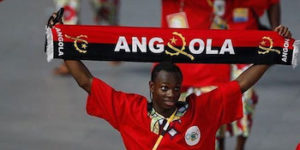
*On this date in 1975, Angola gained independence from Portugal. This repaired the invasion of the 1884 Berlin Conference, the high point of white European competition for territory in Africa, a process commonly known as the Scramble for Africa.
Under colonial law, Black Angolans were forbidden from forming political parties or labor unions. The first nationalist movements did not take root until after World War II, spearheaded by a largely Westernized, Portuguese-speaking urban class that included many mestiços. During the late 1950s, the rise of the Marxist–Leninist Popular Movement for the Liberation of Angola (MPLA) in the east and Dembos hills north of Luanda came to hold special significance.
Formed as a coalition resistance movement by the Angolan Communist Party, the organization’s leadership remained predominantly Ambundu and courted public sector workers in Luanda. Although the MPLA and its rivals accepted material assistance from the Soviet Union or the People's Republic of China, the former harbored strong anti-imperialist views and was openly critical of the United States and its support for Portugal. This allowed it to win important ground on the diplomatic front, soliciting support from nonaligned governments in Morocco, Ghana, Guinea, Mali, and the United Arab Republic.
Portugal's refusal to address increasing Angolan demands for self-determination provoked an armed conflict that erupted in 1961 with the Baixa de Cassanje revolt and gradually evolved into a protracted war of independence that persisted for twelve years. Throughout the conflict, three militant nationalist movements with their partisan guerrilla wings emerged from the fighting between the Portuguese government and local forces, supported to varying degrees by the Portuguese Communist Party.
The National Front for the Liberation of Angola (FNLA) was recruited from Bakongo refugees in Zaire. The National Union for the Total Independence of Angola (UNITA) and the MPLA. When the MPLA first attempted to insert its insurgents into Angola, UPA partisans ambushed and annihilated the cadres on Roberto's orders, setting a precedent for the bitter factional strife that would later ignite the Angolan Civil War.
Throughout the war of independence, the three rival nationalist movements were severely hampered by political and military factionalism and their inability to unite guerrilla efforts against the Portuguese. Between 1961 and 1975, the MPLA, UNITA, and the FNLA competed to influence the Angolan population and the international community. The Soviet Union and Cuba became especially sympathetic towards the MPLA and supplied that party with arms, ammunition, funding, and training. They also backed UNITA militants until it became clear that the latter was at irreconcilable odds with the MPLA.
The collapse of Portugal's Estado Novo government following the 1974 Carnation Revolution suspended all Portuguese military activity in Africa and the brokering of a ceasefire pending negotiations for Angolan independence. With tacit American and Zairean support, the FNLA began massing large numbers of troops in northern Angola to gain military superiority. Meanwhile, the MPLA began securing control of Luanda, a traditional Ambundu stronghold. Sporadic violence broke out in Luanda over the next few months after the FNLA attacked MPLA forces in March 1975.
The fighting intensified with street clashes in April and May, and UNITA became involved after over two hundred members were massacred by an MPLA contingent that June. An upswing in Soviet arms shipments to the MPLA influenced a decision by the Central Intelligence Agency to likewise provide substantial covert aid to the FNLA and UNITA. In August 1975, the MPLA requested direct assistance from the Soviet Union in the form of ground troops.
The Soviets declined, and Cuba was more forthcoming with five hundred combat personnel, sophisticated weaponry, and supplies. By independence, there were over a thousand Cuban soldiers in the country. They were supplied by a massive air bridge carried out with Soviet aircraft. The persistent buildup of Cuban and Soviet military aid allowed the MPLA to drive its opponents from Luanda and blunt an abortive intervention by Zairean and South African troops, which had deployed in a belated attempt to assist the FNLA and UNITA. The FNLA was annihilated mainly, although UNITA managed to withdraw its civil officials and militia from Luanda and seek sanctuary in the southern provinces. Savimbi continued to mount a determined insurgent campaign against the MPLA.
Between 1975 and 1991, the MPLA implemented an economic and political system based on the principles of scientific socialism, incorporating central planning and a Marxist–Leninist one-party state. It embarked on an ambitious nationalization program, and the domestic private sector was essentially abolished. Privately owned enterprises were nationalized and incorporated into a single umbrella of state-owned enterprises known as Unidades Economicas Estatais (UEE).
Under the MPLA, Angola experienced a significant degree of modern industrialization. However, corruption and graft also increased, and public resources were either allocated inefficiently or embezzled by officials for personal enrichment. The ruling party survived an attempted coup d'état by the Maoist-oriented Communist Organization of Angola (OCA) in 1977, which was suppressed after a series of bloody political purges left thousands of OCA supporters dead.